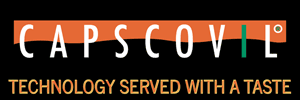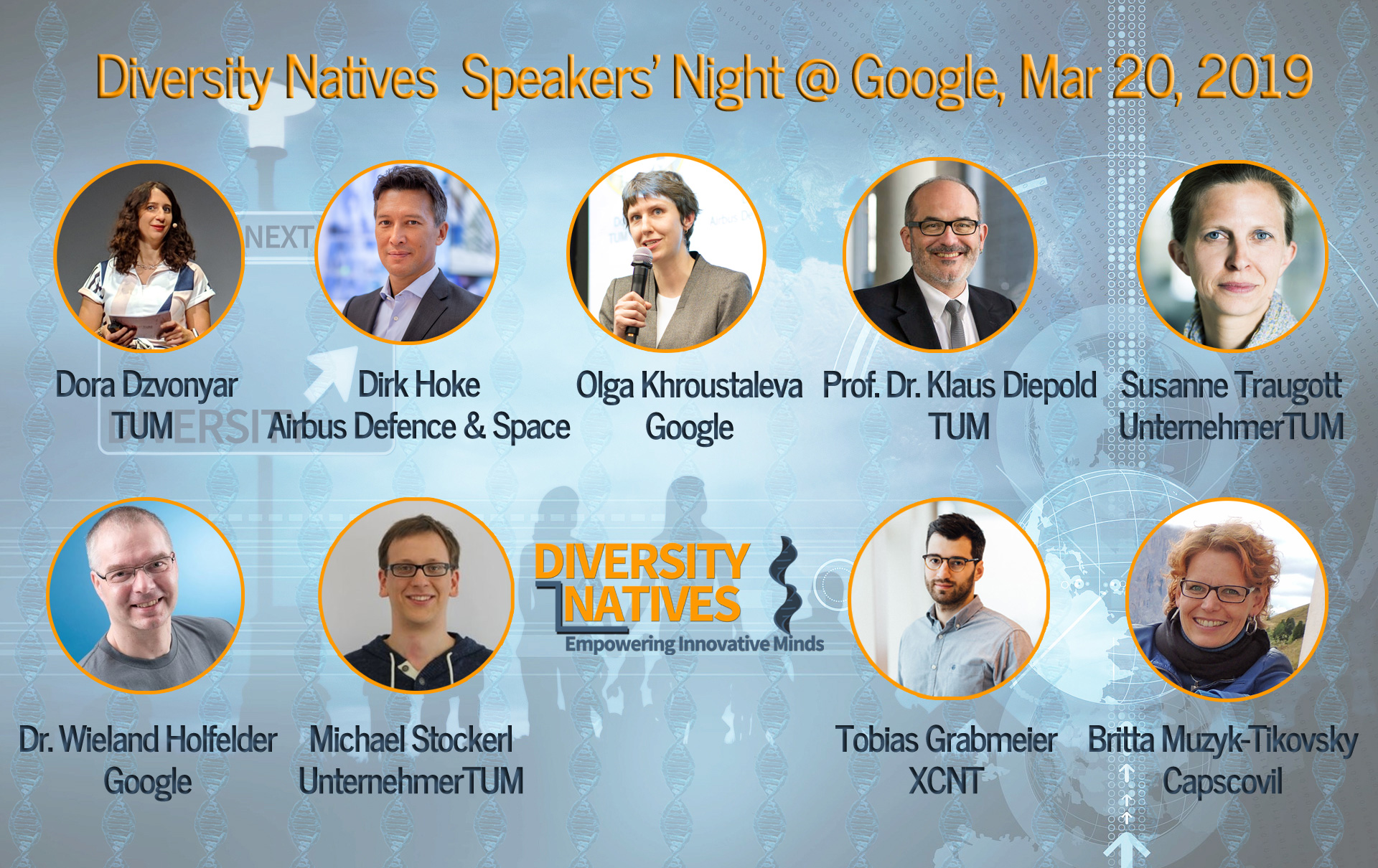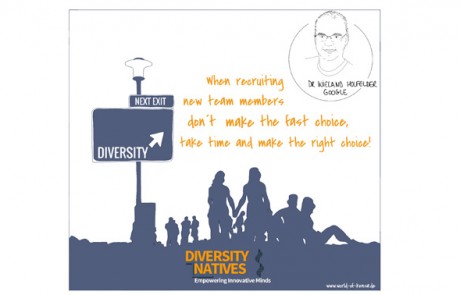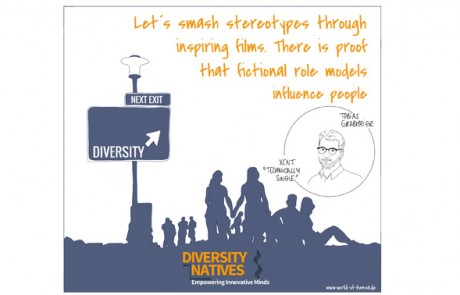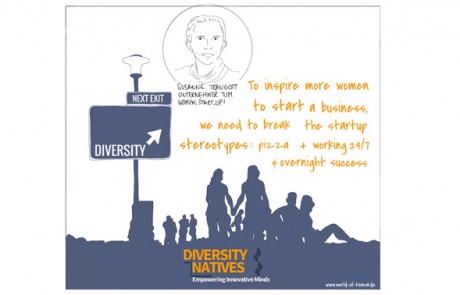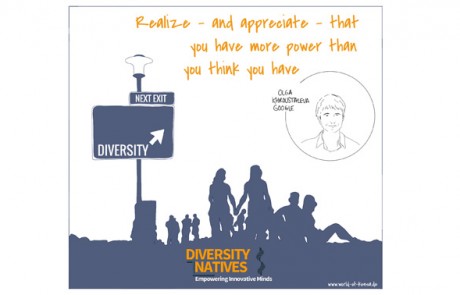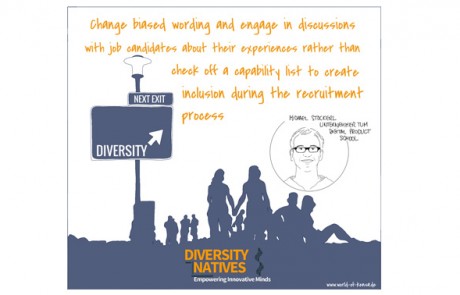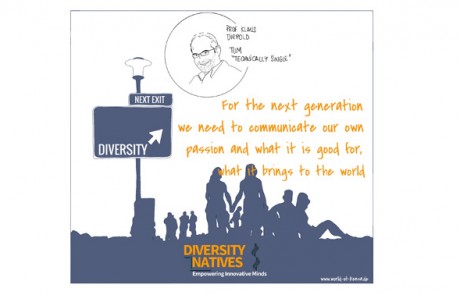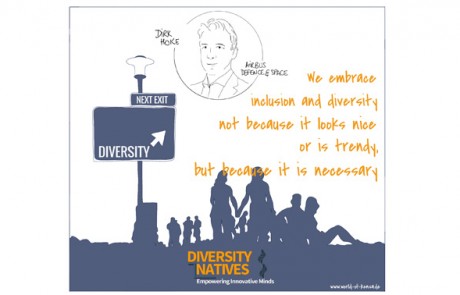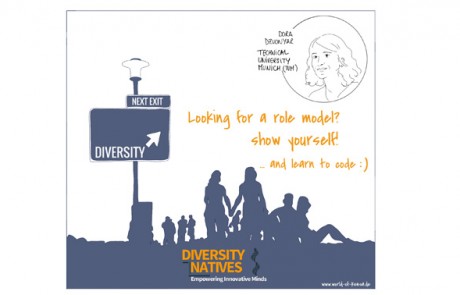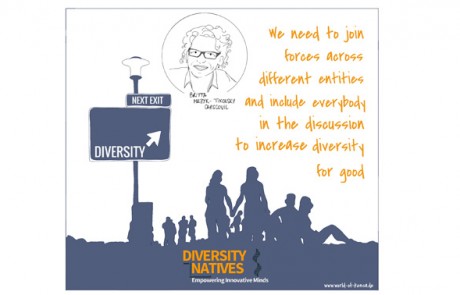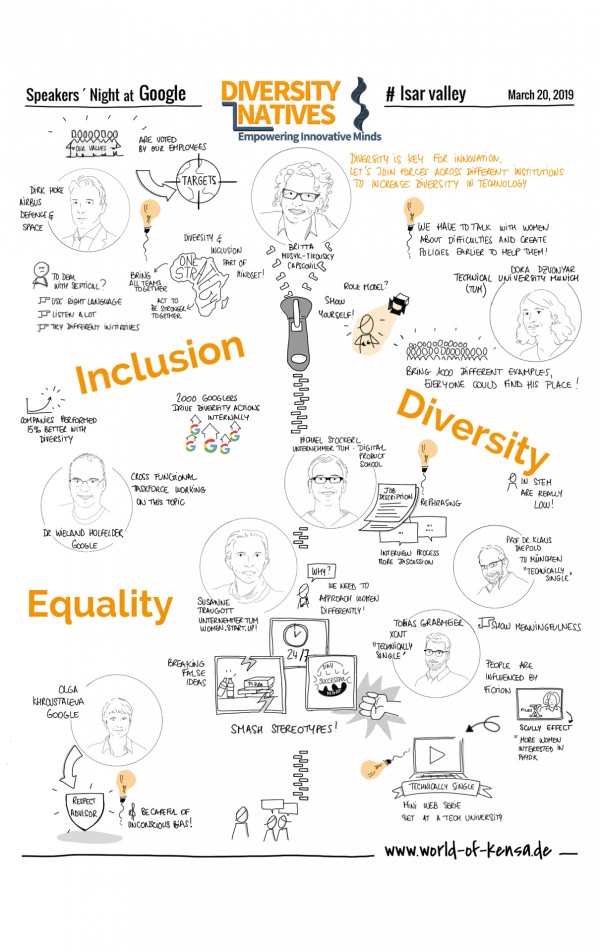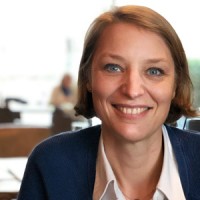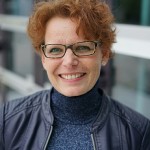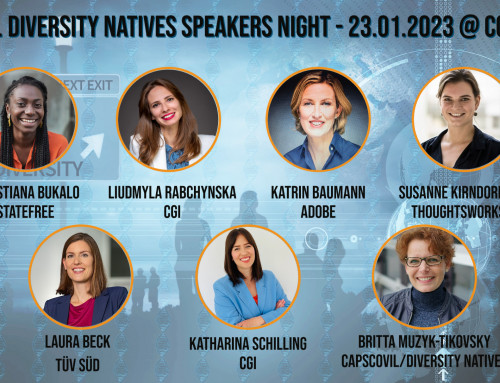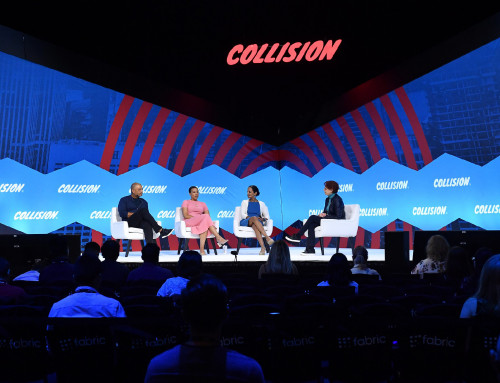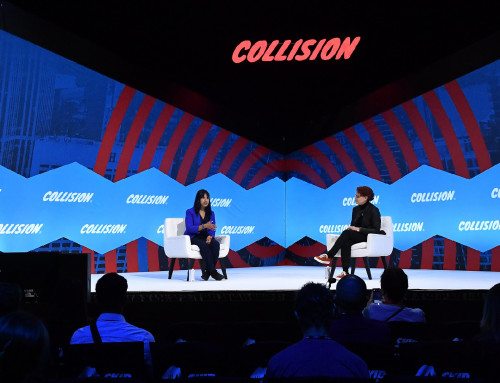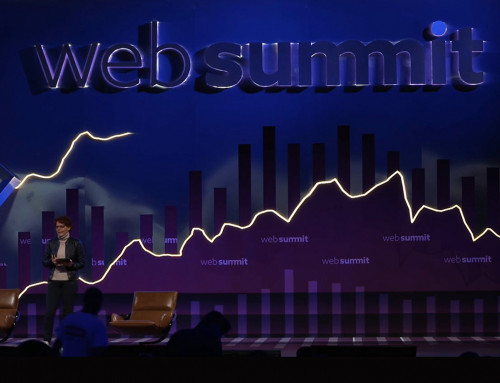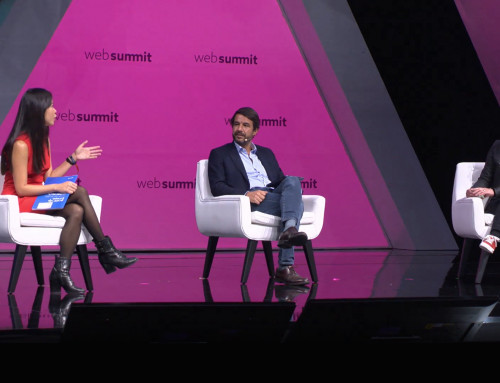Event Report
by Sabine Kennel and Britta Muzyk-Tikovsky
Close to 100 people gathered at the Diversity Natives speaker’s night which was sponsored by Google at their IsarValley on March 20, 2019. Role models and influential leaders from corporations, the startup scene and educational institutions inspired by their projects and efforts to increase diversity and foster inclusion. Because one thing is clear: we need to involve everybody in the discussion. The overwhelming interest with 600 more people on the waitlist shows how important it is to create a place for discussions and exchange.
Welcome by Google
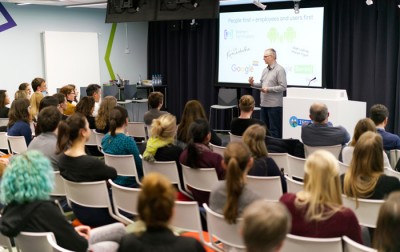 Wieland Holfelder – Vice President Engineering & Site Lead of Google’s Munich Engineering Center kicked-off the event by welcoming the attendees to the “Hackerbridge” location – the heart of technical developments within their Germany business. During his talk, he shared insights into the IT giant’s efforts. In total, 2,000 Googlers drive diversity actions internally and there is a cross-functional task force to work on this topic.
Wieland Holfelder – Vice President Engineering & Site Lead of Google’s Munich Engineering Center kicked-off the event by welcoming the attendees to the “Hackerbridge” location – the heart of technical developments within their Germany business. During his talk, he shared insights into the IT giant’s efforts. In total, 2,000 Googlers drive diversity actions internally and there is a cross-functional task force to work on this topic.
When it comes to employee payments of comparable positions, the company makes no differences. During recruitment of new team members, according to Wieland, project managers are strongly encouraged to take their time and make the right choice for a diverse team instead of going for a fast decision that might lead to imbalanced talent selection. The reason for this is clear: statistics show that diverse companies have a 15% higher performance than others.
Unconscious bias is addressed in training that includes lessons on proximity bias and negative bias, and lessons understanding and working with people affected by disabilities as this is still a topic that some struggle with. There’s also an internal “Respect Advisor” to helps increase awareness and avoid committing a blunder or worse.
Special training based on a concept described in the book “Radical Candor” help steer communication between leaders and employees, and among peers on how to hold effective calibrations and evaluation sessions. Because beating around the bush or silently accepting harmful experience – either personal or work-related – doesn’t help anybody, Wieland stated.
For women, the largest part of underrepresented groups, Google has special initiatives. These range from having their Google Women Techmakers community and supporting the official Girl’s Day to running computer science competitions, and participating in school classes or having a parent’s room in every office location. Google is also strengthening its outreach to external communities and the startup scene. In this sense, it is promising to see that 72% of tech founders view diversity as an important factor for their business.
Driving diversity in a large corporation
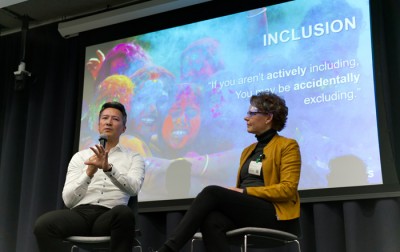 Respect and diversity are also among the core values at Airbus. In Germany, the corporation currently shows a gender diversity of 20%. Dirk Hoke – CEO of Airbus Defence & Space and a strong ambassador for diversity – revealed that he is eagerly working on increasing the number at his division which is at 12,5% at the moment.
Respect and diversity are also among the core values at Airbus. In Germany, the corporation currently shows a gender diversity of 20%. Dirk Hoke – CEO of Airbus Defence & Space and a strong ambassador for diversity – revealed that he is eagerly working on increasing the number at his division which is at 12,5% at the moment.
In his fireside chat with Britta Muzyk-Tikovsky – Founder of the Diversity Natives initiative – he shared a very personal story that laid the foundation for his passion. Dirk grew up in a small town in Lower Saxony, Germany. Among others, the town had two major characteristics: it was conservative and lacked diversity. He experienced first-hand what it means to be different from the majority and how important it is to embrace inclusion.
His career path spans all five continents and this journey cemented his belief in the power that diversity holds. An inspiring example, during his time as CEO of the Cluster Western & Central Africa at Siemens, has been his effort to unite African employees – people from a continent that is highly diverse in itself – and convince them of the potential of working together.
Drawing from the strength of the successful “One Africa” strategy implementation, the first thing he initiated when joining Airbus in 2016 was their #ValueJourney. All employees vote on the company’s values and the vision could not be more clearly reflected in their key value: “We are one”. Dirk is convinced that women leaders make a real difference and it’s inspiring to see that there are already four women in the Executive Committee of Airbus Defence and Space.
When promoting them, Dirk especially excluded the “typical” domains like HR and Finance and rather focused on technical resorts in order to send a strong signal. Remarkably, Grazia Vittadini, the CTO of the Airbus Group, is the former Executive Vice President Head of Engineering at the Defence and Space division. She is a member of the Airbus Executive Committee, serves as Director of the Airbus Foundation Board and is a member of the Inclusion and Diversity Steering Committee.
These changes might at first not get the full buy-in from some conservative minds at the company. But there are several recipes on how to deal with skeptics, Dirk shared. Besides using the right language, it is important to listen a lot in communication with leadership and employees but also to allow room for failures, and to help people learn from them.
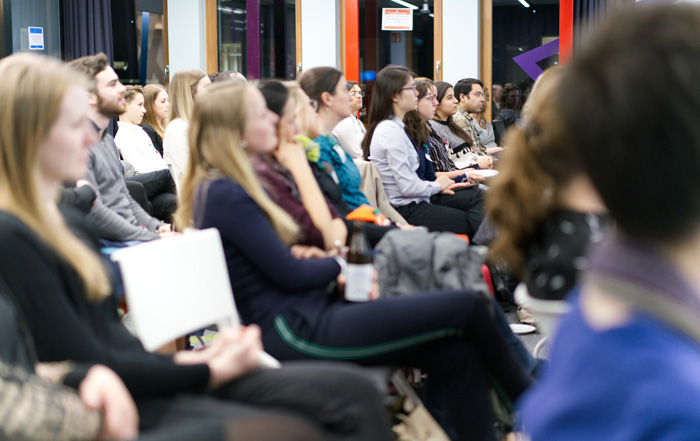
Harassment is not tolerated and everybody is encouraged to speak up if they feel uncomfortable in a situation. Many different initiatives at the division across all management levels support the increase of diversity (Bild). For International Women’s Day, Airbus created a special video. Personal stories like the one of Steffen Linßen encourage others and help to understand the needs of colleagues with special physical abilities. Steffen is more than a role model at Airbus. In 2018, he was a speaker at the main TEDxTUM event together with his friend Daniel. Their goal has been to show how compassion goes further than pity.
Diversity at the interface of higher-level education and entrepreneurship
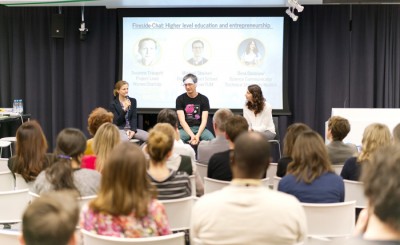 The next panel led by Dora Dzvonyar – lecturer at Technical University Munich, science communicator, and organizer of TEDxTUM – looked at the situation in higher level education and entrepreneurship. In the startup sector, there are more men than women, Susanne Traugott said. Within UnternehmerTUM, she leads the Women.Start.Up! project that specifically supports female founders.
The next panel led by Dora Dzvonyar – lecturer at Technical University Munich, science communicator, and organizer of TEDxTUM – looked at the situation in higher level education and entrepreneurship. In the startup sector, there are more men than women, Susanne Traugott said. Within UnternehmerTUM, she leads the Women.Start.Up! project that specifically supports female founders.
It’s not that there is a lack of interest by women, however, there are still not many found in programs like the accelerator program of UTUM. One of the reasons, she offered, is that women are not very much interested in competition or winning prizes. The ones that found a business tend to be more purpose driven. They want to change certain situations, for example, in education or related to environmental issues.
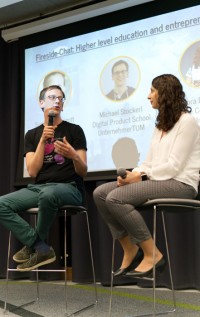 This is a strong reason to support them even more and get the word out that there are institutions who offer to help them. Another observation Susanne shared that female founders are at a different stage in their life. Many women are older than average male founders, and they have kids, a situation which quite often still prevents them from advancing in the corporate world. Women also tend to ponder over founding a business longer, struggling with self-doubt.
This is a strong reason to support them even more and get the word out that there are institutions who offer to help them. Another observation Susanne shared that female founders are at a different stage in their life. Many women are older than average male founders, and they have kids, a situation which quite often still prevents them from advancing in the corporate world. Women also tend to ponder over founding a business longer, struggling with self-doubt.
Especially the latter is something that Michael Stockerl agreed with strongly. He works at the Digital Product School which is part of UnternehmerTUM. It is not uncommon to meet men who just started their studies and who are more confident than women with multiple years of experience on the job. When recruiting new team members, Michael and his colleagues experienced a lack of women who applied. But why?
They looked at what they could do about it and had an idea: maybe it was the job descriptions. So they changed them towards more motivation-focused wording and erased typical all-encompassing phrases like full stack developer by rather asking for a front or back-end developers which reflects a more specific range of capabilities. He also confirmed that they found women to be more skeptical about their abilities.
If female candidates thought they could cover only 80% of the coding skills asked for in the job description they often did not apply. Michael explained how they also changed the interview process and stopped asking technical questions on certain topics or how to solve X. They rather engaged in discussions to understand the experiences and learnings a female candidate had made. Because the answers reflected their capabilities and gave the team at DPS the information they needed to decide on a candidate.
A lack of gender diversity can also be seen at the chair for applied software engineering at TUM where the female rate is 18%, with a slightly positive tendency. In her work as a lecturer in this department, Dora experiences how young female students doubt their abilities. And often, they volunteer too quickly to take care of creating the presentation materials pushing themselves into a supporting rather than a leading role. That’s one more reason to empower them and help them discover, believe in and act on their full potential. Building a network is a powerful enabler, emphasized Dora who is also an ambassador of the Munich Geekettes – a community for women in tech that is open to like-minded men as well.
Susanne agreed and shared her plans to offer different formats and programs to create a whole platform where women feel comfortable to pitch their ideas and talk about personal experiences, even the negative ones. The panel acknowledged the need for breaking typical stereotypes of startup life like living off pizza while working for 24 hours all week long to become successful overnight.
Smashing stereotypes in STEM education
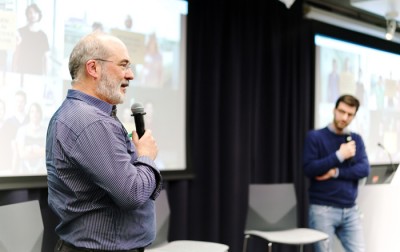
Another gender-related stereotype that needs to be fixed is found in the area of STEM studies. As important it is for women to support other women, diversity is best fostered by including everybody in the discussion. And prominent male proponents of diversity send a strong signal as the Un WOMEN #HeForShe initiative spearheaded by actress Emma Watson shows.
But we don’t have to go searching far into the celebrity world as there are two men right at our doorsteps. Prof. Dr. Klaus Diepold from the Chair for Data Processing at the Department of Electrical and Computer Engineering at TUM shared that the participation of women in STEM studies is really low despite many initiatives.
An interesting example he gave is the gender equality paradox that emerged from several studies: The more gender equality is promoted in a country the less gender balance tends to be found in STEM fields.
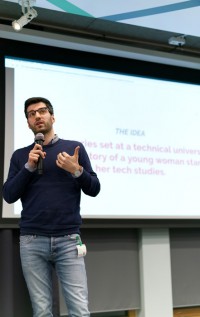
This could potentially be down to the freedom of choice people in these countries feel to have. This might make them pursue any career path they feel is best suited for them as an individual; STEM topics might not be what comes to their mind first.
During his time as Vice President for Diversity and Talent Management at TUM from 2013 to 2015, Klaus thought about ideas on how to change the low participation of women in STEM. He found support in then TUM student Tobias Grabmeier, who now is the co-founder of company builder XCNT. They were convinced that we need to tell interesting stories that show meaning and have the power to smash stereotypes. Research shows that people are influenced by fiction – a prominent example is the so-called Scully Effect stemming from the female lead character of the X-Files series.
Tobias and Klaus created some experimental videos that quickly received thousands of clicks on YouTube. Encouraged by the success, they got serious, gathered a team, and cooked up entertaining stories around young women starting to study. The stories were turned into the mini web series “Technically Single” which is situated at TUM. The launch event in October 2018 was supported by Google. All of the 5 films that are 10 minutes long each can be viewed online at Sixx or Sixx
How to join forces to increase diversity across multiple institutions
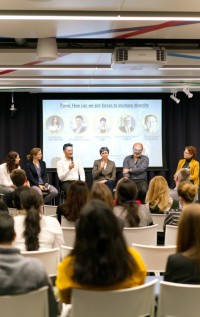 There are many different initiatives and measures taken at a company or institutional level to increase diversity. What can be done to leverage on these and expedite inclusion on a broader scale? During the closing panel Prof. Dr. Klaus Diepold, Dora Dzvonyar, Tobias Grabmeier, Dirk Hoke, Olga Khroustaleva (Google) and Susanne Traugott discussed with moderator Britta Muzyk-Tikovsky how to create an environment that fosters diversity.
There are many different initiatives and measures taken at a company or institutional level to increase diversity. What can be done to leverage on these and expedite inclusion on a broader scale? During the closing panel Prof. Dr. Klaus Diepold, Dora Dzvonyar, Tobias Grabmeier, Dirk Hoke, Olga Khroustaleva (Google) and Susanne Traugott discussed with moderator Britta Muzyk-Tikovsky how to create an environment that fosters diversity.
All panelist united on the importance of role models. And for those, it is not necessary to look at the “Sheryl Sandberg’s” of this world, quite the contrary as those are out of reach for most and may even distort the picture. Instead, people in our network and especially parents can be the biggest role models. Therefore, it’s influential that children from age 6-12 and teenagers experience them at work. Kindergartens or parent rooms at the office are a great way to facilitate this and also help families with balancing work and private life.
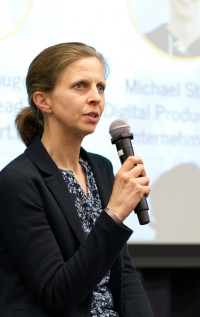
Dedicated summer camps, coding lessons, and science projects or competitions help future generations engage with their parents’ employers and, in return, help them to initiate interest and fill a pipeline of possible future employees. Enabling reciprocal visits to different companies is another way. Some women don’t return to their companies after maternity leave. How can we make sure that their potential and capabilities are not lost in the future?
One possibility is to create a model where women who after parental leave founded their own business can still work together with former employers. Airbus is, together with the administrative district of Munich and the local universities, creating a business incubator at the Defence & Space division’s campus in Taufkirchen. The focus will be on business ideas related to air and space travel, the mobility of the future, security, and industry 4.0.
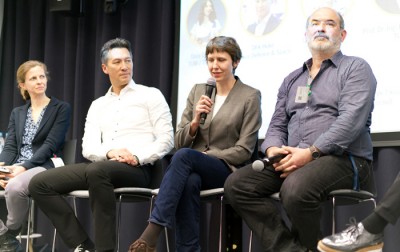 How important it is to build a bridge not only on a physical level but also in the online world shared Olga, user experience lead at Google. Diversity has many shapes, and online services like those of Google need to be designed in such a way that everybody can access them – whether it is supporting the world’s different languages, i.e. Google Translate supports more than 100 languages up to date, or enabling people with impaired hearing or seeing capabilities or people who can’t read or write.
How important it is to build a bridge not only on a physical level but also in the online world shared Olga, user experience lead at Google. Diversity has many shapes, and online services like those of Google need to be designed in such a way that everybody can access them – whether it is supporting the world’s different languages, i.e. Google Translate supports more than 100 languages up to date, or enabling people with impaired hearing or seeing capabilities or people who can’t read or write.
Whenever a new product is developed, all aspects of users’ abilities to use it need to be taken into account. Enabling diversity is also a matter of overcoming bias. Olga doubles as Respect Advisor to help fellow Googlers identify and eliminate (unconscious) bias. In addition, the company is encouraging their employees to become part of a network of people who share their diversity values, so-called Employee Resource Groups.
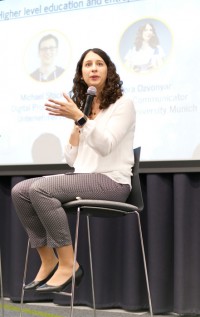
Among those groups are networks for employees of different origin or heritage; with disabilities; part of LGBT; of higher age and lots of experience; for former Google employees. The network for women at Google is by far the largest one and spans across 52 countries. Gender equality is also highly important at the independently organized TEDxTUM event.
Organizer Dora explained that this goes hand in hand with the diversity of good ideas worth sharing on stage. That’s why their dedicated research for speakers spans across multiple fields and backgrounds. One thing they observe is that women whom they invite to speak often recommend other people instead: almost as if they cannot believe that it’s them the team would like to see on stage. The curation team starts to find out about the “why” or the difficulties these women might see and then, once the match is obvious, convinces them. All speakers receive personalized support and coaching by the curation team until it is time to give their talk on stage.
The panel closed with all speakers sharing their thoughts to inspire participants in what they can do for themselves or their network.
About Diversity Natives
Diversity Natives is an initiative by Capscovil’s founder Britta Muzyk-Tikovsky with the goal to foster innovation by embracing diversity and inclusion in technology and business. For more information on how to get involved as a business, sponsor, ambassador, or community member, visit the website or send us an email.
